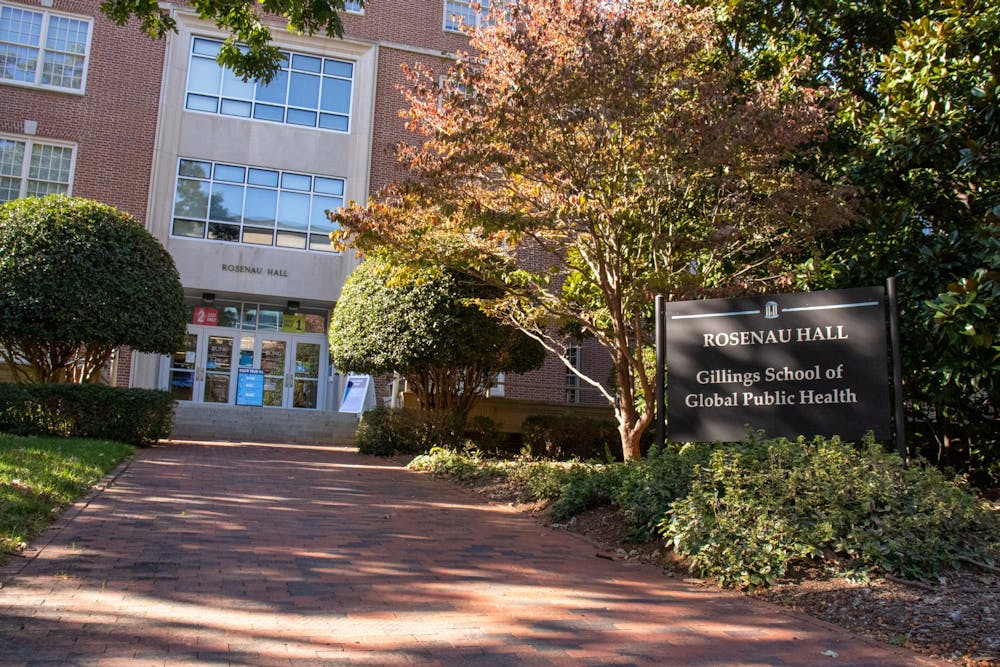While the drug was initially evaluated to treat Ebola, it was not FDA-approved prior to the pandemic.
“But there’s one thing that ties Ebola to SARS-CoV-2, and that is the protein that these viruses use to replicate their own genome," Sheahan said. "They’re similar enough that remdesivir, which acts on this protein that replicates RNA, works against various coronaviruses.”
When they first started developing the drug back in 2015, Sheahan said, their goal was to develop a therapy against MERS, an emerging coronavirus at the time.
“Everything we did was kind of working up to that, and then COVID happened,” he said.
Since data showed that remdesivir worked against various coronaviruses, he said, they quickly tested it against SARS-CoV-2 at the onset of the COVID-19 pandemic. Sheahan said that all of that prior research contributed to the rapid employment of the drug for human clinical trials.
“That was just insane, that the work we were doing at UNC could be playing a role in saving people’s lives down the street at UNC Hospitals," he said. "It’s just a very unusual thing for someone to experience because normally, it’s pretty rare that you work on developing a drug that actually gets approved and is used to save lives.”
A ‘gap’ between UNC policy and research
While UNC has helped create the first FDA-approved COVID-19 treatment, it garnered criticism for its reopening of campus at the start of the fall semester. One week after the first day of class, UNC switched to all-remote classes and de-densified residential housing.
John Bamforth, the director of the Eshelman Institute for Innovation at the UNC pharmacy school, acknowledged criticism of UNC’s response during the pandemic, but maintained support for the role the University plays in research.
“You know where the missteps may be, but I think more importantly, the role that we’re playing in the long-term future of pandemics and pandemic preparedness is something we should all be proud of,” he said.
Megan Castle, a first-year biology student, expressed a reserved congratulations at the news of the approval.
“I’m really proud of the fact that UNC produced something so notable and it gives me a lot of hope for the prospects of COVID,” Castle said. “At the same time, it’s a little unsettling to me how we can have such impactful research going on, and yet it feels like there’s a gap between that and our administration.
To get the day's news and headlines in your inbox each morning, sign up for our email newsletters.
“It’s a little embarrassing to me that you can be producing things like that, and still be one of the first campuses to completely close down.”
University spokesperson Joanne Peters Denny said in a statement that UNC is proud of its top researchers, who have played a role in advising campus reopening plans.
"We are fortunate to have their expertise and will continue to rely on them as we navigate the pandemic," Peters Denny said.
The future of drug development initiatives
Bamforth, who is also the director of the Rapidly Emerging Antiviral Drug Discovery Initiative, said that the COVID-19 pandemic has impacted drug discovery for potential future pandemics.
“We lucked out to a degree with remdesivir because it was already being developed for a different virus,” Bamforth said. “The challenge right now with these novel viruses is that they’re emerging more and more frequently.”
The mission of READDI is to project around three viral families that possible novel viruses may arise from and then develop novel antivirals ready for use when the next virus arrives.
"The thing to understand about the biology of viruses is that they all live in human host cells,” Bamforth said. “The work that we’re doing is looking at the biology of the host cell and finding novel targets within those host cells that we can use drugs against.”
The approval of remdesivir is the first step of many in the development of COVID-19 treatments, Sheahan said. Research on whether the combination of remdesivir with an antibody or other antiviral drug could improve the treatment of the coronavirus is next, he said.
“I guess we should have some feeling of closure, but I definitely don’t,” Sheahan said.
university@dailytarheel.com




